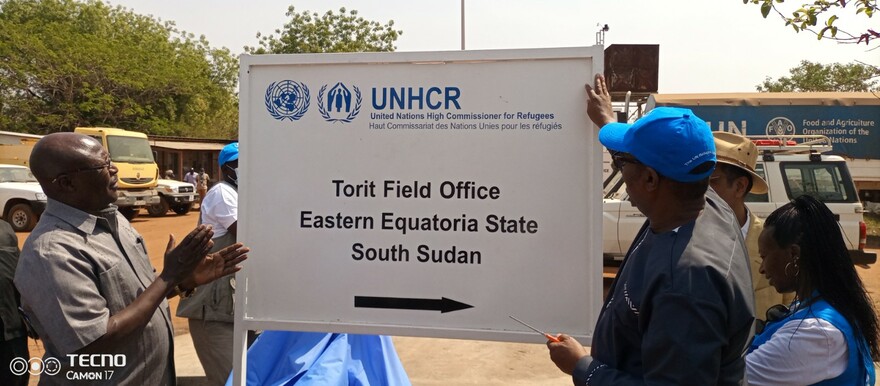At least 87,072 voluntary returnees are in urgent need of humanitarian assistance in Magwi County, Eastern Equatoria State, local officials said over the weekend.
David Otto Remson, the Magwi County commissioner, made the revelation during the visit of the special envoy of the high commissioner for refugees in the horn of Africa, Ambassador Mohamed Abdi Affey, and the UNHCR Country representative, Arafat Jamal, to Magwi County on Saturday.
He said over 85,000 refugees voluntarily returned to Magwi County between 2021 and early 2022.
“The community of Magwi County is returning home simultaneously and the total number of returnees from January 2021 to 2022 is 87, 082,” Commissioner Otto said. “There are still some challenges such as lack of water, education, health services, roads, food centers, and the presence of cattle in the county which discourage returnees and affect the community.”
Last week UNHCR reopened its Torit field office to handle issues of returnees.
The UNHCR special envoy to the Horn of Africa, Ambassador Mohamed Abdi Affey, applauded the state leadership for maintaining peace among the returnees and promised to provide support.
“We are very happy to be received by happy faces. Even with all the challenges, you are very happy and smiling,” Ambassador Affey said. “We are coming here to see how we can help. We will not solve all the problems but we shall partner will your state government and the Government of South Sudan on how best we can help you.”
For his part, John Loriko, the national director-general for administration and finance at the Relief and Rehabilitation Commission (RRC) acknowledged the suffering of the returnees and promised to give them 300 bags of rice.
“Now the government has taken the lead to take care of those returnees in partnership with UNHCR,” Loriko said. “There will be a time we will come and talk more with you but for now I have a small contribution for you, 100 bags of rice for the returnees and then I will also contribute 200 bags of rice to the agricultural team.”
Hellen Rose, a returnee from the Amoro refugee camp in northern Uganda said she was proud to be home but complained about the shortage of basic services.
“What pains us is that getting food is difficult here at home you need to cultivate. If there is no food, we always end up doing small businesses and only get little profit,” Rose said. “That is why we are crying for help for additional food, schools, and other services to keep us home as opposed to going back to the refugee camps.”
Simon Ladu Okumu, the representative of the returnees in Agoro Payam said life in the refugee camp was horrible and that finding employment was difficult. He appealed to the government to help the returnees with services and humanitarian assistance.
“Help us with education, roads, health and then support our community with something which will bring progress so that we will be in peace in this area,” Ladu said. “In agriculture, you can help and also train people because we have plenty of lands.”
He added that more refugees were eager to return home but worried about insecurity and lack of basic services such as schools and health services.
The returnees also complained about the presence of cattle, saying it hinders and threatens life and food security.




